|
|
|
Sort Order |
|
|
|
Items / Page
|
|
|
|
|
|
|
| Srl | Item |
| 1 |
ID:
132897
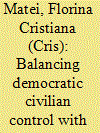

|
|
|
|
|
| Publication |
2014.
|
| Summary/Abstract |
This article reviews Romania's intelligence reform after 1989. Specifically, it looks at intelligence reform before and after Romania's accession to the North Atlantic Treaty Organization (NATO) in 2004, and the European Union (EU) in 2007. It finds that Romania has made considerable progress in intelligence reform. That is because Romania, which expressed its desire and commitment to join NATO/EU after 1989, has worked hard to comply with these organizations' membership demands (including intelligence reform). After NATO/EU integration (when demands on balancing control and effectiveness virtually vanished), despite continued openness efforts made by agencies, control/oversight diluted. Thus, post-NATO/EU, while effectiveness is being strengthened, democratic control lessens.
|
|
|
|
|
|
|
|
|
|
|
|
|
|
|
|
| 2 |
ID:
132892
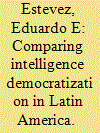

|
|
|
|
|
| Publication |
2014.
|
| Summary/Abstract |
This article aims to contribute to the understanding of the intelligence democratization process in new democracies comparing three South American countries: Ecuador, Peru, and Argentina. With a background of authoritarian legacies ('political police' style intelligence agencies controlled by the military) under particular political circumstances and changing strategic environments, these countries experienced disparate trajectories, prescriptions, and outcomes in their efforts to reform their intelligence communities. Drawing on new institutionalism, historical moments and relevant events shaping the dynamics of intelligence democratization are highlighted for each case, depicting failures and successes, and identifying drivers of change.
|
|
|
|
|
|
|
|
|
|
|
|
|
|
|
|
| 3 |
ID:
132887
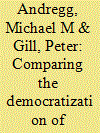

|
|
|
|
|
| Publication |
2014.
|
| Summary/Abstract |
This introductory article discusses some of the main themes that are contained within this collection originally delivered as papers to two conferences. There is brief consideration of some issues of method and major themes relating to the legacy of authoritarian regimes, the process of change and the current state of 'democracy' are identified. Continuing controversies and uncertainties around intelligence have important implications for democratic governance in many countries which must encourage more comparative work in this key area of intelligence studies.
|
|
|
|
|
|
|
|
|
|
|
|
|
|
|
|
| 4 |
ID:
132889
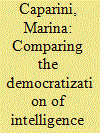

|
|
|
|
|
| Publication |
2014.
|
| Summary/Abstract |
This article discusses the reform of intelligence governance in two sub-regional groupings of former communist states: East Central Europe and the Balkans. These two sub-regions are delineated according to the pace and nature of transformations that they have undergone since the collapse of communist rule and their relations with respect to the European Union, the key political and economic organization in Europe. A number of lessons are drawn from comparing experiences in the two sub-regions relating to democratic reform of the security apparatus, and in particular the intelligence sector. Significant factors in the consolidation of democratic governance of intelligence include the nature of precursor communist-era regimes and the legacies they created, whether armed conflict has occurred during the transition, the extent and character of external (especially EU) assistance, and the strength of media and civil society. These factors appear to have influenced how transitional regimes have sought to introduce institutional reforms to constrain the powers of those services and their susceptibility to arbitrary use. They also have influenced measures taken to redress abuses by intelligence services under the preceding communist regime and the legitimation of the post-authoritarian state.
|
|
|
|
|
|
|
|
|
|
|
|
|
|
|
|
| 5 |
ID:
132895
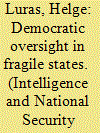

|
|
|
|
|
| Publication |
2014.
|
| Summary/Abstract |
In most transition countries the main aim of 'democratizing intelligence' is to weaken the authoritarian governmental structures by introducing more transparency, legality and oversight. In Bosnia and Herzegovina however, the state-building efforts driven by international parties combined formal democratization processes such as independent oversight with the strengthening and operational capacity building of previously weak-to-non-existent intelligence structures. In parallel with the descent into war when Yugoslavia collapsed in the early 1990s, the State Security Service (SDB) in the Republic of Bosnia had split into three ethnically-based outfits answering to the political and military leaders of war. 'Democratization' of intelligence in Bosnia and Herzegovina since the establishment of a unified, state-level Intelligence and Security Agency (OSA) in 2004 has followed its own unique path reflecting the fragmented nature of politics in Bosnia and the leading role of international organizations in proposing and effectuating institutional reforms. Nevertheless, in terms of habits, operational methods and values many Bosnian intelligence officers went through similar adaptations and transitions as their colleagues in countries where institutions at the time of democratic transition were too strong and authoritarian rather than, as in the case of Bosnia, being deemed too weak and ineffectual.
|
|
|
|
|
|
|
|
|
|
|
|
|
|
|
|
| 6 |
ID:
132890
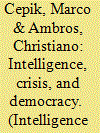

|
|
|
|
|
| Publication |
2014.
|
| Summary/Abstract |
This article analyzes why institutional crises are bound to happen and how they impact on national intelligence systems' development. Punctuated Equilibrium theory is reviewed and employed to explain one institutional crisis in each of Brazil, Colombia, South Africa, and India. In Brazil, the case study is the fall of the Brazilian Intelligence Agency (ABIN) director in 2008, following the Satiagraha operation conducted by the Federal Police Department (DPF). In Colombia, the 2009 wiretapping scandal known as chuzadas is examined. In South Africa, the investigation in Project Avani (2006-8) is reviewed. Finally, in India the case study is the intelligence crisis following the Mumbai terrorist attacks in 2008. We found that institutional crises are inevitable because there are tensions between security and democracy, both being co-evolutionary dimensions of successful contemporary state building. However, the impacts of such crises vary across the four cases pending on three variables: (1) degree of functional specialization inside the national intelligence system; (2) degree of external public control over the national intelligence system; (3) whether effectiveness, legitimacy or both were the main drivers of the crisis. Our analysis of the four case studies suggests that the amount of positive institutional change in the aftermath of an intelligence crisis is greater in countries with more functional specialization and stronger external control mechanisms.
|
|
|
|
|
|
|
|
|
|
|
|
|
|
|
|
| 7 |
ID:
132893


|
|
|
|
|
| Publication |
2014.
|
| Summary/Abstract |
Despite the emergence of Brazil as a global power, little is known about its security and intelligence services and the way they are seen by Brazilian society. This article analyzes the Brazilian perception of the role of its intelligence services and the relationship between the intelligence community (IC) and the decision makers. The historical background of intelligence in Brazil and a general overview of the Brazilian IC after the reestablishment of democracy are presented, as well as the general mechanisms of control and accountability of the secret services. Finally, there is consideration of some concerns on reforming the intelligence sector and its control and oversight apparatus.
|
|
|
|
|
|
|
|
|
|
|
|
|
|
|
|
|
|
|
|
|